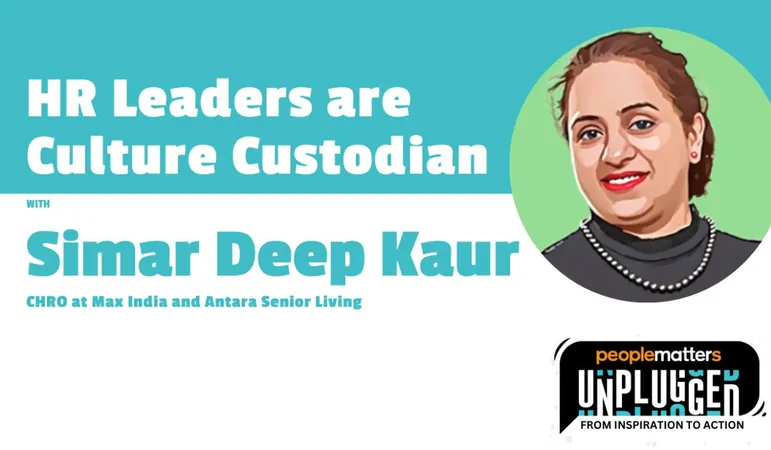
Unpacking Workforce Diversity and Strategic HR Leadership with Simar Deep Kaur on Unplugged 3: Transforming the Workplace Experience!
2024-11-21
Author: Siti
In today's fast-paced business landscape, Human Resources (HR) has undergone a remarkable transformation, evolving beyond its traditional support function to that of a strategic partner integral to shaping organizational culture and driving business success. This evolution is vividly illustrated through the insights shared by Simar Deep Kaur, the Head of HR at Max India and Antara Senior Living, during her recent appearance on Season 3 of People Matters Unplugged.
Kaur elucidates the emerging challenges HR leaders face, notably workforce diversity, employee value propositions (EVP), and the delicate balance between strategic leadership and employee advocacy. This emphasizes the pivotal role of HR in aligning workforce management with organizational objectives, where the engagement of employees translates directly into long-term business success.
The Future of HR: A Strategic Force for Growth
With a wealth of experience across the Asia-Pacific (APAC) region, Kaur offers a refreshing perspective on the changing demands within HR. She highlights the increasing recognition of HR’s strategic role in fostering organizational growth and shaping workplace cultures that can adapt to the rapidly changing environment.
As Kaur articulates, the future of work hinges on HR leaders' ability to meld business strategies with employee needs. Their influence on organizational performance and employee satisfaction will pave the way for a resilient workforce and an innovative culture, crucial in an increasingly competitive market.
The Challenge of Workforce Diversity
One of the most pressing challenges in the modern workplace is managing a multi-generational workforce, particularly pertinent to the APAC region. Today’s workforce includes a spectrum from Baby Boomers to Gen Z, each group bringing its own set of values, expectations, and motivations. According to Kaur, HR professionals must develop engagement strategies that cater to these diverse perspectives, ensuring all employees feel valued and heard.
Kaur pointedly notes, “A one-size-fits-all strategy is outdated. We must respect generational differences while ensuring our engagement efforts align with productivity goals.” This tailored approach is essential for enhancing employee morale, thereby driving competitiveness and innovation within businesses.
The discussions regarding the changing work landscape, notably emphasized by trends like the "Great Resignation" and "quiet quitting," underline the need for HR leaders to reassess their EVP. Crafting an EVP that resonates with diverse employee segments can be complex, especially when the goal is personalization while remaining budget-conscious.
At Max India, Kaur has made strides in forming an EVP that recognizes employees' diverse backgrounds while aligning with the company’s core mission—critical for fostering meaningful employee engagement amid budget constraints.
Balancing Strategic Leadership with Advocacy
Kaur emphasizes that the role of HR has expanded to become both a strategic advisor to management and a staunch advocate for employees. Gone are the days when HR was solely focused on administration; now, HR leaders actively engage in high-level discussions regarding cost control, organizational growth, and productivity.
However, as Kaur keenly notes, HR must navigate the tricky waters between driving strategic initiatives and championing employee well-being. “The ability to influence both organizational performance and employee satisfaction,” she stresses, “is what sets HR apart as a fundamental force behind business success.”
With automation and technology permeating every aspect of HR—from recruitment to performance evaluation—there's increased capacity for HR professionals to focus on strategic alignment and innovation. Kaur views technological advancements not just as efficiency leads but as catalysts for reimagining HR’s role in driving long-term business value.
Advice for Aspiring HR Leaders
For those entering the HR field, Kaur's advice is both practical and motivating. She underscores the need to deeply understand the business context to effectively align HR initiatives with corporate strategies. Building robust relationships with line managers and employees is also essential for successfully implementing HR strategies.
“HR must act as a bridge,” Kaur explains, “ensuring alignment between leadership and employees on organizational priorities.” She also stresses the significance of cultivating a growth mindset. Being open to learning and adapting is vital in this ever-evolving field.
Finally, Kaur encourages aspiring HR professionals to embrace their work passionately. “Positivity and enthusiasm are infectious,” she asserts, “and as HR leaders, we must inspire others through our energy and dedication.”
As Season 3 of People Matters Unplugged unfolds, focused on transforming "Inspiration to Action," expect insightful discussions that continue to shape the evolving future of work. Stay tuned—this journey promises not just strategic insights but actionable outcomes that resonate across industries!





 Brasil (PT)
Brasil (PT)
 Canada (EN)
Canada (EN)
 Chile (ES)
Chile (ES)
 España (ES)
España (ES)
 France (FR)
France (FR)
 Hong Kong (EN)
Hong Kong (EN)
 Italia (IT)
Italia (IT)
 日本 (JA)
日本 (JA)
 Magyarország (HU)
Magyarország (HU)
 Norge (NO)
Norge (NO)
 Polska (PL)
Polska (PL)
 Schweiz (DE)
Schweiz (DE)
 Singapore (EN)
Singapore (EN)
 Sverige (SV)
Sverige (SV)
 Suomi (FI)
Suomi (FI)
 Türkiye (TR)
Türkiye (TR)